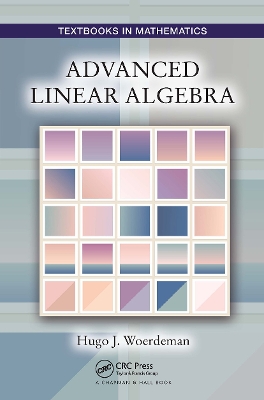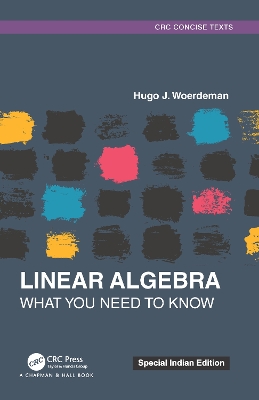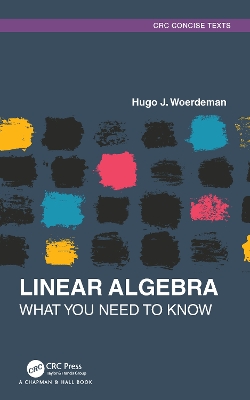Textbooks in Mathematics
3 total works
Advanced Linear Algebra features a student-friendly approach to the theory of linear algebra. The author’s emphasis on vector spaces over general fields, with corresponding current applications, sets the book apart. He focuses on finite fields and complex numbers, and discusses matrix algebra over these fields. The text then proceeds to cover vector spaces in depth. Also discussed are standard topics in linear algebra including linear transformations, Jordan canonical form, inner product spaces, spectral theory, and, as supplementary topics, dual spaces, quotient spaces, and tensor products.
Written in clear and concise language, the text sticks to the development of linear algebra without excessively addressing applications. A unique chapter on "How to Use Linear Algebra" is offered after the theory is presented. In addition, students are given pointers on how to start a research project. The proofs are clear and complete and the exercises are well designed. In addition, full solutions are included for almost all exercises.
There is good reason to be excited about Linear Algebra. With the world becoming increasingly digital, Linear Algebra is gaining more and more importance. When we send texts, share video, do internet searches, there are Linear Algebra algorithms in the background that make it work.
This concise introduction to Linear Algebra is authored by a leading researcher presents a book that covers all the requisite material for a first course on the topic in a more practical way.
The book focuses on the development of the mathematical theory and presents many applications to assist instructors and students to master the material and apply it to their areas of interest, whether it be to further their studies in mathematics, science, engineering, statistics, economics, or other disciplines.
Linear Algebra has very appealing features:
•It is a solid axiomatic based mathematical theory that is accessible to a large variety of students.
•It has a multitude of applications from many different fields, ranging from traditional science and engineering applications to more ‘daily life’ applications.
•It easily allows for numerical experimentation through the use of a variety of readily available software (both commercial and open source).
Several suggestions of different software are made. While MATLAB is certainly still a favorite choice, open-source programs such as Sage (especially among algebraists) and the Python libraries are increasingly popular. This text guides the student to try out different programs by providing specific commands.
There is good reason to be excited about Linear Algebra. With the world becoming increasingly digital, Linear Algebra is gaining more and more importance. When we send texts, share video, do internet searches, there are Linear Algebra algorithms in the background that make it work.
This concise introduction to Linear Algebra is authored by a leading researcher presents a book that covers all the requisite material for a first course on the topic in a more practical way.
The book focuses on the development of the mathematical theory and presents many applications to assist instructors and students to master the material and apply it to their areas of interest, whether it be to further their studies in mathematics, science, engineering, statistics, economics, or other disciplines.
Linear Algebra has very appealing features:
•It is a solid axiomatic based mathematical theory that is accessible to a large variety of students.
•It has a multitude of applications from many different fields, ranging from traditional science and engineering applications to more ‘daily life’ applications.
•It easily allows for numerical experimentation through the use of a variety of readily available software (both commercial and open source).
Several suggestions of different software are made. While MATLAB is certainly still a favorite choice, open-source programs such as Sage (especially among algebraists) and the Python libraries are increasingly popular. This text guides the student to try out different programs by providing specific commands.


